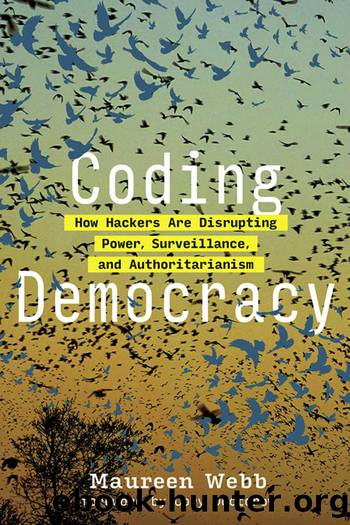Coding Democracy by Maureen Webb

Author:Maureen Webb [Webb, Maureen]
Language: eng
Format: epub
Tags: hacking; surveillance; Stephen Levy; hacker; hacker ethic; Chaos Computer Club; Edward Snowden; Julian Assange; privacy; cybersecurity; free software; encryption; Berlin
Publisher: The MIT Press
Published: 2020-03-13T00:00:00+00:00
Solid?
Tim Berners-Lee, the inventor of the World Wide Web and Harry Halpin’s boss at the World Wide Web Consortium (W3C), seems to be working on this project. But a pall hangs over the work because Berners-Lee, respected elder statesman and Lorax steward of the internet, recently greenlighted a standard for a mechanism that would implement digital rights management (DRM) on that very web.
In his role as executive director of W3C, Berners-Lee was final arbiter of what the standards council’s recommendation on this would be, and he tipped in favor of industry wishes to have a standard. The Electronic Frontier Foundation, Richard Stallman, and many others in the hacker and digital rights community fought vigorously against it. There was a stark lack of consensus. In July 2017, a secret vote by members ran 108 for and 57 against, with 20 abstentions, among the 185 members who voted.94 Nevertheless, one man decided the issue. So much for the Lorax style of “consensus” governance.
To appreciate what a big issue this now is in the technology world, recall the description of DRM and the Digital Millennium Copyright Act (DMCA) statutory regime provided in chapter 8. Hackers and others against the recommendation argued that the W3C would essentially be endorsing the DRM-DMCA model, making it harder to get the regime repealed. More immediately, it would be blessing the insertion by corporations of “black boxes” of code into everyone’s computer through a standard mechanism, the encrypted media extension (EME), built into their web browsers. Black boxes into which corporations could include, in addition to the copyrighted materials that users’ wished to access, all their usual malware to dictate terms of use, invade privacy, compromise security, and otherwise take control of users’ computers. The EME mechanism was designed for video only, but W3C potentially could adopt standards for all kinds of DRM restricted material on the Web, including ebooks, documents, software updates, and pages for web services. Researchers and security experts were prevented from even looking into these black boxes to study what was there because the Digital Millennium Copyright Act made it a crime to do so. The DMCA ran over the rights of “fair use” people had to study what was in the black boxes and to use the copyrighted material itself for fair-use purposes. It effectively killed fair use, an essential element in any copyright regime that aims to promote innovation and knowledge.
According to hackers and digital rights proponents, DRM, DMCA, and EME broke the architecture of the free and open web, making it insecure and unfixable. If users could not monitor what their browser was admitting into their computer, they were hooped. Browsers are the door to everything on the web. DRM, DMCA, and EME injected the poison of black code into the system and made it criminal to clean up the pollutions it spread. It was a model that potentially encouraged a draconian lockdown of everything on the web—the gift to humankind that was supposed to be leading us all forward with its model of sharing and abundance.
Download
This site does not store any files on its server. We only index and link to content provided by other sites. Please contact the content providers to delete copyright contents if any and email us, we'll remove relevant links or contents immediately.
| Anarchism | Communism & Socialism |
| Conservatism & Liberalism | Democracy |
| Fascism | Libertarianism |
| Nationalism | Radicalism |
| Utopian |
The Secret History by Donna Tartt(18053)
The Social Justice Warrior Handbook by Lisa De Pasquale(11930)
Thirteen Reasons Why by Jay Asher(8397)
This Is How You Lose Her by Junot Diaz(6401)
Weapons of Math Destruction by Cathy O'Neil(5779)
Zero to One by Peter Thiel(5443)
Beartown by Fredrik Backman(5292)
The Myth of the Strong Leader by Archie Brown(5202)
The Fire Next Time by James Baldwin(4985)
How Democracies Die by Steven Levitsky & Daniel Ziblatt(4931)
Promise Me, Dad by Joe Biden(4890)
Stone's Rules by Roger Stone(4818)
100 Deadly Skills by Clint Emerson(4647)
Rise and Kill First by Ronen Bergman(4524)
A Higher Loyalty: Truth, Lies, and Leadership by James Comey(4520)
The David Icke Guide to the Global Conspiracy (and how to end it) by David Icke(4348)
Secrecy World by Jake Bernstein(4342)
The Farm by Tom Rob Smith(4293)
The Doomsday Machine by Daniel Ellsberg(4220)
